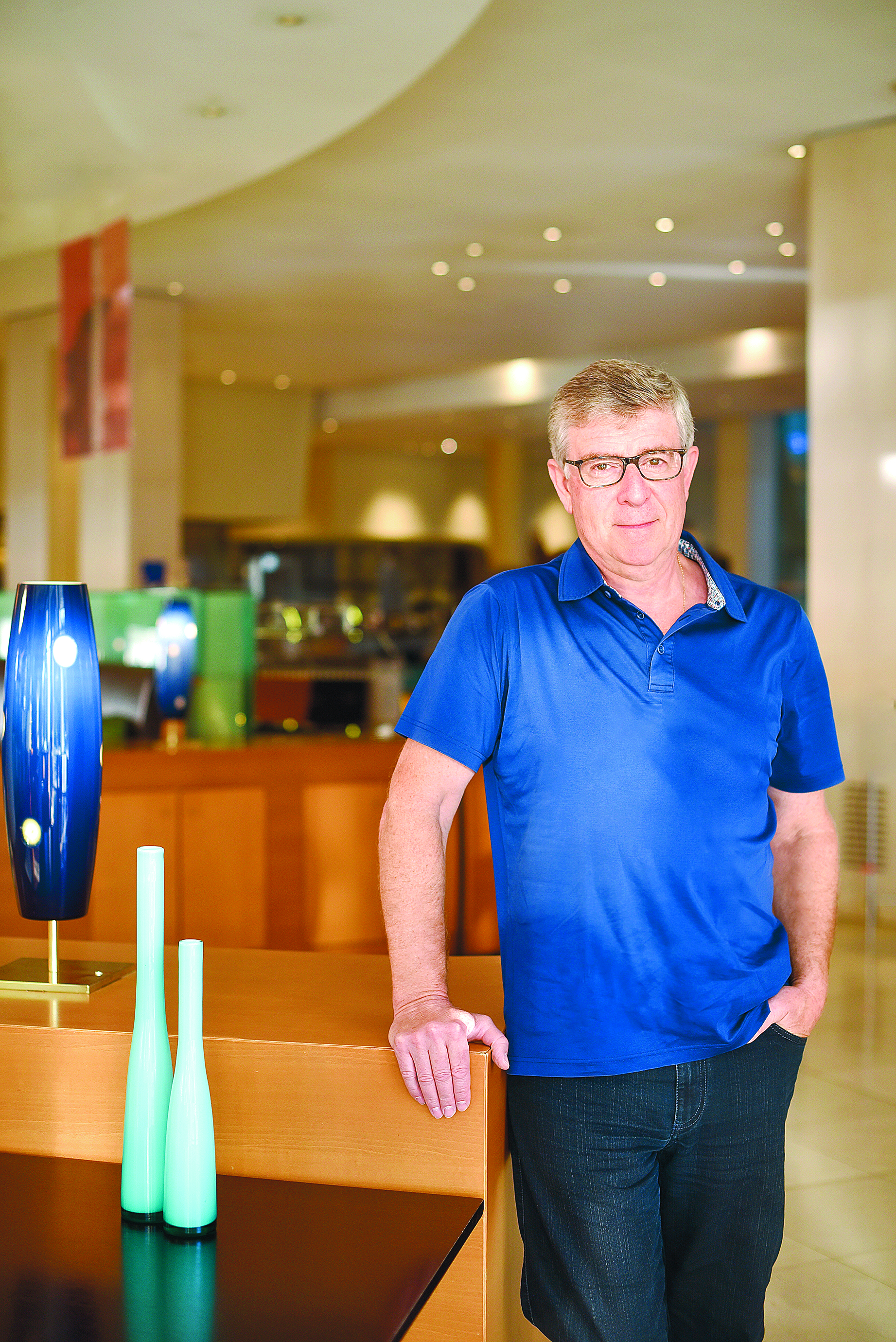Strengthen exports of Greek varieties
The president and CEO of one of the largest wine and alcohol retailers in the world, based in Ontario, Canada, speaks to Kathimerini

George Soleas was forced from his home due to the Turkish invasion of Cyprus when he was only 16 years old, in July 1974. After a few months in the island’s south, where the Greeks Cypriots fled to for safety, his family moved to Canada. He worked in restaurants and first studied biochemistry, then oenology in California, followed by postgraduate degrees from the University of Toronto. Today, he is one of largest wine merchants in the world.
Soleas is the president and chief executive officer of the Liquor Control Board of Ontario (LCBO), which records annual sales of some 7.2 billion dollars. However, despite his best efforts, only 4.5 million dollars of those sales are Greek wines. He spent this summer in Greece, as he does every year. This year, a day before his return to Toronto, he spoke to Kathimerini in Athens.
Do you come to Greece every year?
I have been coming to Greece yearly for the last 35 years. Sometimes, even twice a year. Once for holidays, and once to meet with wine experts and winemakers.
To convince you to purchase their wines?
That too. We also have discussions on the steps needed to sell their wines abroad.
What do you advise them?
To strengthen local varieties even more. Xinomavro, Agiorgitiko, Moschofilero, Mavrotragano, Assyrtiko and others. Local varieties that showcase Greek wines.
Winemaker Vangelis Gerovassiliou told me that the sudden changes in the weather – excessive sunlight, droughts, flooding – are affecting imported varieties more than domestic varieties.
It makes sense. Agiorgitiko has grown in Greece for hundreds of years. It has found a way to survive. This also applies to Assyrtiko and Xinomavro.
Does Greece have good wines?
Today it does. Twenty years ago, they were terrible. Our vineyards were untended, we did not have proper labels, and we did not have the right wine experts.
We had retsina though (laughs)…
Yes, just that we were the only ones drinking retsina, and other similar lower-qualities wines. My father-in-law used to tell me, “This is Cognac,” and I replied, “Yes, because it is oxidized.”
Did you say that out loud?!
Not to my father-in-law (laughs). I would tell others though. You need to be honest, even if it hurts. It is the only way to achieve change. I think you tried something of the sort with politics.
Back to wine. Who were the first Greeks to realize that we could bottle better wines?
They were the people who went abroad and studied winemaking. Gerovassiliou, George Skouras, Angelos Iatrides. When they returned to Greece, they lay the groundwork for a radical shift. Slowly it dawned on everyone that something had to change. Yiannis Tselepos, Yiannis Boutaris, Yannis Vogiatzis, and the rest. Like an epidemic of quality!
Do you only drink Greek wines in Canada?
No, but I do host Greek wine tastings at my house. I invite Greeks and non-Greeks and encourage them to try the wines. Anyone I work with knows that I promote Greek wines.
How much of the wine you sell is Greek?
Our sales of Greek wines account for approximately 4.5 million dollars, while our overall wine sales are about 7.2 billion dollars. The competition is fierce. California is right next door. Of course, there are also many Italians, Portuguese, Spanish, and Latin Americans in Canada, and they all have very good wine. Greece has a mountain to climb to compete with them.
Are Greek wines expensive compared to the competition?
They are not expensive given their quality, even if I have repeatedly said that it is worth not earning a profit until your brand is successful. When you’re competing with wines from Italy, France, New Zealand, unless you’re the cheapest, no non-Greek consumer will pick Greek wine over them.
And those countries’ wines have been in the market for much longer. But Greek wine is growing in popularity and people have begun to ask for it. I have told Greek producers – and they have agreed – to prioritize domestic vintage wines. That is what will make them stand out. People have grown tired of purchasing Cabernet Sauvignon, Merlot and Sauvignon Blanc.
And if they want a Merlot, they’ll buy one from its country of origin.
Exactly. If you want a Sauvignon Blanc, your first thought will be the Loire Valley or New Zealand. You won’t think to yourself, “Ah, I’ll buy a Greek Sauvignon Blanc.” Even if the Sauvignon Blanc of the Alpha Estate is quite good. The Kokkinomylos by Tselepos, which is 100% Merlot, is also incredible and very affordable. But you’ll buy your Merlot from somewhere else if you’re not in Greece. We need to showcase Greece through Xinomavro, Assyrtiko, Moschofilero, Mavrodaphne and Mavrotragano.
And Romeiko, too, to include Hania. Manousakis produces it now.
I have not yet tried it, but it’s hard to make a good wine with Romeiko. Manousakis makes good wines and an excellent Roussanne. But when you can buy French Roussanne, would you get the one bottled by Manousakis?
There’s another point of view, though, that argues that if a Canadian consumer sees a label with the word Xinomavro on it, they won’t recognize it, but if they see a Syrah bottle, on the other hand, they’ll know exactly what it is.
That’s correct. We need to somehow simplify the names of our vintages. The Germans are facing the same issues we are. You do not buy a wine with a name you cannot pronounce. How are you supposed to remember it?
Take Agiorgitiko: In English you could call it Saint George, which is easier to remember. Xinomavro is slightly more complicated. Assyrtiko is easier, however, and one of the reasons it is very successful. Simplifying the names is a necessary step. As is simplifying the labels on the bottles. The name Gerovassiliou is difficult. Thankfully, these days, if someone tries a good wine, they can take a photo of the label with their phone. This has somewhat reduced the problems with naming, which used to be a huge issue.
How many of your 2,675 stores stock Greek wine?
It’s not easy to have Greek wine available in every store. That’s why we created a destination collection, with 80 or 90 different Greek wines in the Greek neighborhood in Toronto. We have advertised the collection and many people visit the store to pick up a bottle. Anyone can also purchase wine online from our website.
How do you choose specific wines from a country?
Let’s use Chile as an example, a country with outstanding wines. Chileans are the “Germans” of Latin America. Hard-working and organized, they export over 70% of what they produce.
How do you purchase wines from Chile then?
We announce that we are in the market and dealers representing these wines – their representatives if you will – make us their offers.
So do you only purchase from representatives, essentially middlemen, and not from producers themselves?
That is the rule. Every producer must have a representative. I do not agree with it myself, but that’s the way it works. Now for Chilean wines, we have over 200 offers, and we must pick 15.
What are the criteria used for selecting them?
The most important factor is the price-quality relationship, and of course the marketing budget. We also must try all the wines before choosing. Of course, if a wine is very successful in a different market and is selling, for example, 50,000 crates in a market like the US, it has an advantage.

Anyone who tries a nice wine in Greece will ask for it in Canada
Does Cyprus, your homeland, have quality wines?
We have good domestic varieties. Maratheftiko, Xynisteri, but they are found in small quantities, and are expensive. Stefanos Koundouras, who was instrumental in helping Greek winemakers, is now assisting their Cypriot counterparts. The best-known Cypriot wine is Commandaria, a sweet wine, which is one of the best desserts, and we are importing it to Canada.
Does Turkey have any good wines?
Nope, they don’t even export. They have raki, which has limited demand, and nothing else. Georgia is slowly ramping up production of quality wines, as are Croatia and Slovenia. This is why we need to hurry up. Winemakers who export their wines are not only benefiting their businesses, but the whole of Greece. They are the country’s ambassadors. If someone tries a nice wine in Greece, they’ll ask for it in Canada when they return. If it has a nice label, they’ll even send it to their friends.
What food oil do you use in Canada?
I use my own olive oil from Crete. We have two small groves. We obviously only use olive oil at home. I am unwavering on that issue.
Is there a market for Greek products in Canada?
Absolutely. Olive oil, honey, Greek mountain tea, Kalamata olives, and of course yogurt. If there is no “Greek Yogurt” label, people won’t buy it anymore. It’s the same with feta cheese, with Dodoni coming to Canada now. Everyone knows Greek feta cheese is the best in the world.
We also reign supreme in souvlaki (laughs)…
Of course. Greek Town has 20 or 30 Greek restaurants, cheap dishes and freshly grilled meat, and they’re always full. But people started having different standards though. Now, Costas Spiliadis is opening Mylos. There is another restaurant about to open, Petros. There was also Mythos, where for months after its grand opening you still couldn’t find a table to reserve. They are good restaurants, not cheap, with good Greek wines.
How did you join the LCBO?
By chance. In 1986 there was an international scramble because they had detected something in alcoholic beverages, they believed was linked to cancer. A large winemaker in Canada was looking for a biochemist to work on the issue. That is how my lifelong story with wine started. I worked there for 11 years, and I have been with the LCBO for a further 24. I worked my way up the ranks from the bottom and for the last five years I have been president and CEO.
That means you’re president of one of the largest dealers of alcoholic beverages in the world.
Yes, we have 11,000 employees, 675 stores in Ontario and we are wholesalers to another 2,000 stores. We have sales of 7.2 billion dollars, of which 2.5 billion is profit along with 800 million in taxes. We transfer somewhere in the region of 50 million dollars a week to the Province of Ontario. It funds state projects, schools and healthcare. There are no private healthcare and welfare institutions in Canada, everything is public and free.
A state monopoly on alcohol in a free market? That’s an international paradox.
It’s also the case in 18 US states, as well as Norway, Sweden and Finland. However, it is not a pure monopoly, it is more of an oligopoly.
I assume that began so the state could control consumption and was maintained because it was so profitable?
Yes, the LCBO was founded in 1927 after the end of Prohibition. Our stores don’t sell to children under the age of 18 or those in a dependent relationship with alcohol. We are also the only organization on the planet that chemically tests everything we buy before it hits the shelves.





